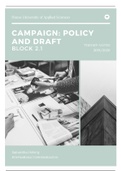,Table of Contents
OVERVIEW ...................................................................................................................................................... 1
LECTURES WEEKS 1-7 ...................................................................................................................................... 1
LECTURE 1: INTRODUCTION AND CAMPAIGN PLANNING .................................................................................................. 1
LECTURE 2: BEHAVIOUR AND ENVIRONMENT ................................................................................................................ 1
LECTURE 3: BEHAVIOURAL THEORIES ........................................................................................................................... 2
LECTURE 4: SEGMENTATION, TARGETING AND COMMUNICATION OBJECTIVES ..................................................................... 3
LECTURE 5: BEHAVIOURAL DETERMINANTS AND COMMUNICATION TOOLS I ........................................................................ 6
LECTURE 6: BEHAVIOURAL DETERMINANTS AND COMMUNICATION TOOLS II ....................................................................... 8
LECTURE 7: BEHAVIOURAL DETERMINANTS AND COMMUNICATION TOOLS III ...................................................................... 9
PRINCIPLES AND PRACTICE OF SOCIAL MARKETING ...................................................................................... 11
WEEK 1 ............................................................................................................................................................... 11
WEEK 3 ............................................................................................................................................................... 12
WEEK 4 ............................................................................................................................................................... 12
WEEK 5,6 AND 7 ................................................................................................................................................... 14
WEEK 6 EXTRA ...................................................................................................................................................... 15
GCS GUIDE 2014............................................................................................................................................ 16
WEEK 1 ............................................................................................................................................................... 16
WEEK 2 ............................................................................................................................................................... 17
WEEK 5, 6 AND 7 .................................................................................................................................................. 17
GCN 2011 ...................................................................................................................................................... 19
WEEK 2 - 7........................................................................................................................................................... 19
MARKETING COMMUNICATIONS: A EUROPEAN PERSPECTIVE ...................................................................... 21
WEEK 3 ............................................................................................................................................................... 21
WEEK 4 ............................................................................................................................................................... 26
CASI CARDS................................................................................................................................................... 28
OASIS............................................................................................................................................................ 32
RESEARCH ..................................................................................................................................................... 33
LECTURE 1: INNOVATION PROCESS: INTRODUCTION AND ORIENTATION PHASE .................................................................. 33
LECTURE 2: DESIGN RESEARCH: THE RESEARCH IN DESIGN RESEARCH .............................................................................. 35
RESEARCH LECTURE 3: THE DESIGN IN DESIGN RESEARCH .............................................................................................. 36
SKILLS ........................................................................................................................................................... 37
ORIENTATION INTERVIEW ........................................................................................................................................ 37
ROLE OF CONSULTANT, BUSINESS ENGLISH AND CRITICAL SUMMARIES .............................................................................. 37
Chapter 2: Flawless Consulting ..................................................................................................................... 38
Critical summaries ........................................................................................................................................ 39
THEORY SEMINARS ....................................................................................................................................... 40
WEEK 2: BEHAVIOUR AND ENVIRONMENT .................................................................................................................. 40
RESEARCH SEMINAR ..................................................................................................................................... 41
WEEK 2: THE RESEARCH IN DESIGN RESEARCH.............................................................................................................. 41
Notes............................................................................................................................................................. 42
ENGLISH........................................................................................................................................................ 44
, Overview
CPD2 will be assessed by a closed book, open question exam containing both questions about research as
well as communication theory. The length of the exam is 3 hours. Communication theory is 50% and
Research also 50% of the exam.
The study material for communication theory is:
• Selected chapters from De Pelsmacker
• Additional theory per week
• All the general lectures, including the slides
• Seminars
Government Communication Service (2014). The Government Communication Service Guide to Communications
and behaviour change
- pp. 1- 8 paras 4 and 5, pp. 11., pp.12-16
Donovan, R., & Henley. N (2010). Principles and practice of social marketing : An international perspective,
Cambridge: University Press
- Chapter 5: Principles of communication and persuasion. pp. 88-90 and pp. 94-102, pp.102-103 (ELM),
pp.105-110, pp. 119-123
Donovan, R. & Henley, N. (2010). Principles and practice of social marketing: An international
perspective. Cambridge: University Press
- Chapter 10: Segmentation and targeting: pp. 252-268.
OASIS – A Guide to Campaign Planning.
Government Communication Network (2011) Communications and behaviour change
- p. 15-26 and pp. 23-27, pp 20-22, pp.30-33 and pp. 36-38, and 45-46 (audience insights)
De Pelsmacker, P., Geuens, M. & Bergh van den, J. (2018) Marketing communications: A European perspective.
Pearson, 2018
- Chapter 3: How marketing communications work. pp. 78-113.
- Chapter 4: Marketing communications planning. pp.125-144.
The study material for research is:
• All the general lectures, including the slides
• Seminars
• The two books on the literature list: Baarda, and Hanington
• The research design handbook
• (the research design handbook tries to link research concepts to sources to indicate to students
which concepts in Baarda, for example, they need to focus on)
, Lecture 2: Behaviour and Environment
Lectures Weeks 1-7
Lecture 1: Introduction and Campaign Planning Accountability – everything needs to be evidence-based
Campaign – a planned sequence of communications and interactions that uses a
compelling narrative over time to deliver a defined and measurable outcome.
Theories:
1. Behavioral Economics - the effects of psychological, cognitive, emotional,
cultural and social factors on the economic decisions of individuals and
institutions
2. Social Psychology - how other people’s presence, especially within a
group, can influence our intentions, attitudes, motivations and behavior.
3. Social Marketing Communication - marketing principles aimed at
changing behaviour.
Types of Campaigns
Behavioural change campaigns - Primary goal: behavioural change; Secondary Social environment – influences people’s behaviour ‘What others think of you’
goal: attitude change through social environment and Social norms:
Media Advocacy Campaigns – aim to change public policy rather than individual • Descriptive norms: we base our own behavior on how
behavior and to reach opinion leaders and policy makers other people act (what is)
Brand campaigns – aim for brand preference and behavioural change • Injunctive norms: the rules and regulations that tell us
what we should do (what ought to be) – more effective
due to social pressure
Local environment – if a local environment puts barriers in the way of a behavior,
it is unlikely that it will succeed. (close environment)
Wider environment – Economy, taxation, legislation, technology etc.
Contextual determinants – all that is/has been and will be communicated about
the issue (media and IPC)
Policy instruments to change behaviour (3Es)
Engineering: development of a technology or innovation
1




